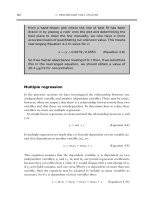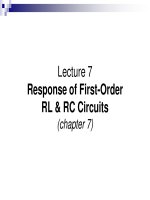Lecture Essay writing & presentation skills - Lecture 7: Types of Essays
Bạn đang xem bản rút gọn của tài liệu. Xem và tải ngay bản đầy đủ của tài liệu tại đây (360.44 KB, 23 trang )
Lecture 7
Types of Essays
Recap
I. What is an Outline?
A. Sentence outline
B. Topic Outline
II. Purpose for Using an Outline
A. To help organize key ideas in writing an
essay or research paper
B. To help summarize key ideas in reading
C. To help you develop subtopics
What is an Essay?
•
•
An essay is an organized
collection of your thoughts on a
particular topic.
An essay consists of three major
parts:
1.
Introduction
2.
Main body
3.
Conclusion
3
Writing Process
•
Pre-writing Stage
o
Pre-writing
o
Free-writing
o
Note keeping
o
Brain storming
o
Mind Mapping
§
Writing Stage
§
Re-writing
4
What is an Essay?
•
Essays can be either:
o
Long or Short
o
Serious or Humorous
o
Formal or Informal
o
Can describe your opinions
or be a synopsis of
expert
5
What is an Essay?
Writers use essays to:
•
Describe or define a subject (What is an Essay?)
•
Compare related items in a subject
(The Difference Between Apples and Oranges)
•
Show cause and effect (If You Write It, They Will
Read)
•
Write a narrative (My Summer Vacation)
•
Explain a process (How to Write an Essay)
•
Deliver an argument (The Case Against Essay
6
Questions)
How to Write an Essay
A successful essay
should meet a number
of
other
criteria.
Consider these points to
perfect
your
essay
7
Types of Essays
There are many different kinds of essays.
The following are a some of the most
common ones:
•
Descriptive Essay
•
Definition Essay
•
Compare and Contrast Essay
•
Cause and Effect Essay
•
Narrative Essay
8
Descriptive Essay
The descriptive essay provides details about how
something looks, feels, tastes, smells, makes one feel, or
sounds.
It can also describe what something is, or how something
happened.
These essays generally use a lot of sensory details. The
essay could be a list-like description that provides point by
point details.
Examples: A descriptive essay could describe . . .
* a tree in my backyard;
9
2. Definition Essay
A
definitio
10
Compare/Contrast Essay
The
compare/co
ntrast essay
11
Cause/Effect Essay
The cause/effect essay explains why or how
some event happened, and what resulted from
the event.
•
•
A cause essay usually discusses the
reasons why something happened
An effect essay discusses what happens
after a specific event or circumstance.
Examples: A cause/effect essay may explain . . .
12
Narrative Essay
The narrative essay tells a story. It can
also be called a "short story."
•
Conversational in style
•
Tells of a personal experience
Examples: A narrative essay could tell
of ...
* my brother's and my fishing trips;
13
Argumentative Essay
An argumentative essay is one that attempts
to persuade the reader to the writer's point of
view.
The writer can either be serious or funny, but
always tries to convince the reader of the validity
of his or her opinion.
Examples: An argumentative essay may persuade a
reader that . . .
* he or she should use public
transportation instead of driving
14
Critical Essay
A critical essay analyzes the strengths, weaknesses
and methods of someone else's work.
A critical essay can be written about another essay,
story, book, poem, movie, or work of art.
Examples: A critical essay may analyze . . .
* how Shakespeare presents the character, Hamlet, in his
play, Hamlet;
* the strengths and weaknesses of the movie, Bol;
15
Evaluation Essay
•
•
Each day we face various facts and
scenes, and to act adequately we need to
develop our assessment of them.
Writing an evaluation essay is a good way
to size up a certain item, phenomenon,
entity, or any other object.
Examples:
–
a vacation spot;
–
a new restaurant;
16
Reflective Essay
•
•
In reflective essay, you express your
thoughts and emotions about certain
events or phenomena.
Writing this type of essay is good training
to sharpen your critical thinking skills, as
well as your ability to develop and express
opinions on a particular topic.
Examples:
–
a trip to an exotic place;
17
Analysis Essay
•
An analysis essay assumes that you break
a larger subject into subcategories
–
then examine each subcategory to form an
opinion about the whole
–
explain how each subcategory is interrelated
and come up with your own conclusions
Examples:
•
Economic crisis and the rate of unemployment;
•
Replacing School Textbooks With Laptops
18
Expository Essay
•
They are pieces of scholarly writing which
describe or examine a process of some
kind in a comprehensive way:
–
analyze a concept
–
describe and explore a written work or an
event;
–
explain detailed instructions or a description of
a method or procedure
Examples:
19
Common methods of
beginning: Cohesion and
Coherence
•
The
introducti
20
1.
3.
The introduction is intended to lead the reader into the
topic and clarify what the essay will specifically deal with;
•
usually consists of one paragraph
•
the amount of background information the context
requires
•
Introduction will contain a key sentence (or, if necessary,
more than one).
The main body deals with the major ideas that support the
statement;
•
Each main idea is presented in a separate paragraph
•
developed with supporting ideas in the form of
explanations, definitions, or similar, and illustrated with
examples where appropriate or necessary.
3. The conclusion brings the reader back to the purpose of the
essay and draws all the points together before making a final
21
comment on the result of the discussion.
Coherence and Cohesion
Ultimately an essay will show a
progression from a general level (in the
introduction) down to the specific (the
statement and body) and back up to the
general level again(conclusion). The
reader will be expecting this so it gives
your essay a sense of completion. In
other words, the essay must have
Coherence and Cohesion
22
References
•
/>
23









